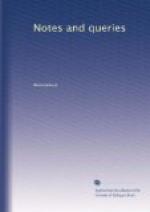S.W.S.
Mickleham, Nov. 10. 1849.
* * * * *
ON A PASSAGE IN GOLDSMITH.
Sir,—I observe in the Athenaeum of the 17th inst. a quotation from the Life of Goldsmith by Irving, in which the biographer seems to take credit for appropriating to Goldsmith the merit of originating the remark or maxim vulgarly ascribed to Talleyrand, that “the true end of speech is not so much to express our wants as to conceal them.”
This is certainly found in No. 3. of The Bee, by Goldsmith, and no doubt Talleyrand acted upon the principle of dissimulation there enunciated; but the idea is much older than either of those individuals, as we learn from a note in p. 113. of vol. lxvii. Quart. Rev. quoting two lines written by Young (nearly one hundred years before), in allusion to courts:—
“Where Nature’s end of language
is declined,
And men talk only to conceal their
mind.”
Voltaire has used the same expression so long ago as 1763, in his little satiric dialogue La Chapon et la Poularde, where the former, complaining of the treachery of men says, “Ils n’emploient les paroles que pour deguiser leurs pensees.” (see xxix. tom. Oeuvres Completes, pp. 83, 84. ed. Paris, 1822.)
The germ of the idea is also to be found in Lloyd’s State Worthies, where speaking of Roger Ascham, he is characterised as “an honest man,—none being more able for, yet none more averse to, that circumlocution and contrivance wherewith some men shadow their main drift and purpose. Speech was made to open man to man, and not to hide him; to promote commerce, and not betray it.”
Lloyd’s book first appeared in 1665, but I use the ed. by Whitworth, vol. i. p. 503.
F.R.A.
Oak House, Nov. 21. 1849.
[The further communications
proposed to us by F.R.A. will be
very acceptable.]
* * * * *
ANCIENT LIBRARIES—LIBRARY OF THE AUGUSTINIAN EREMITES OF YORK.
Mr. Editor,—I have been greatly interested by the two numbers of the “NOTES AND QUERIES” which you have sent me. The work promises to be eminently useful, and if furnished with a good index at the end of each yearly volume, will become a book indispensable to all literary men, and especially to those who, like myself, are in charge of large public libraries.
To testify my good will to the work, and to follow up Mr. Burtt’s remarks on ancient libraries published in your second number, I venture to send you the following account of a MS. Catalogue of the Library of the Monastery of the Friars Eremites of the Order of St. Augustine in the City of York.
This MS. is now preserved in the Library of Trinity College, Dublin, amongst the MSS. formerly belonging to the celebrated Archbishop Ussher. It is on vellum, written in the 14th century, and begins thus:—




